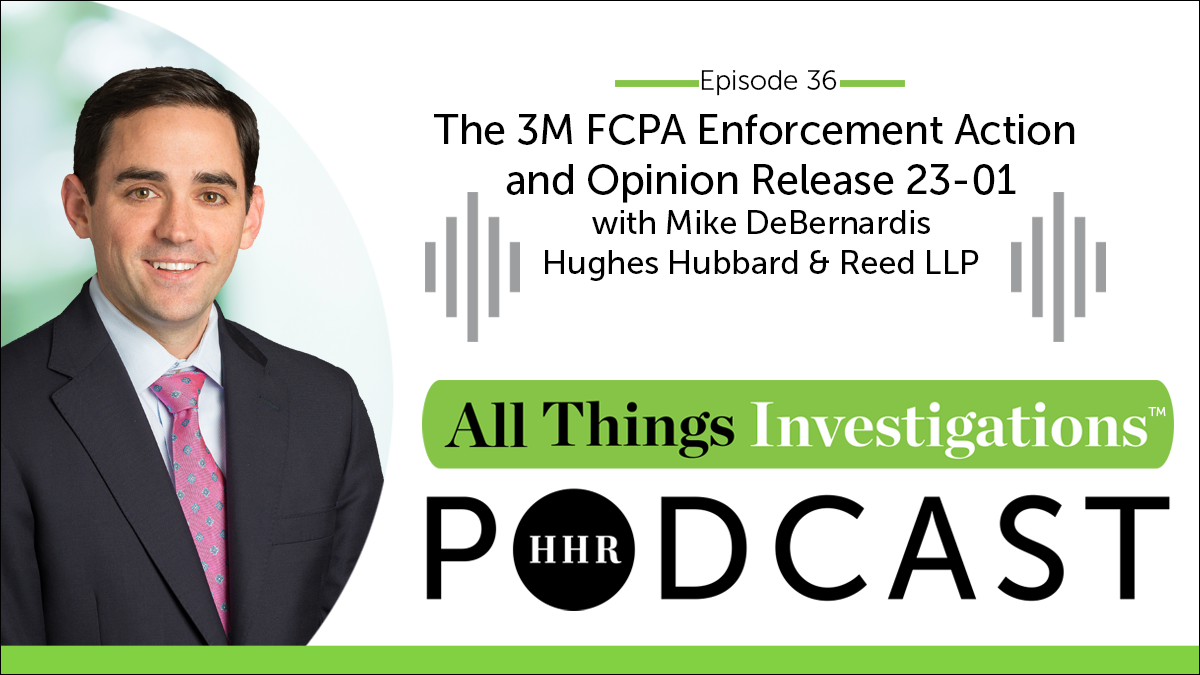
In this episode of All Things Investigations, host Tom Fox delves deep into the significant enforcement action by the SEC against 3M in China with guest Mike DeBernardis. The action revolves around the provision of covert trips to Chinese government officials by 3M to secure business deals. These concealed itineraries raised eyebrows due to tell-tale signs like simultaneous scheduling of tourist activities with educational events and an absence of proper translation services.
Mike DeBernardis is a partner in Hughes Hubbard’s Washington office and a member of the firm’s Anti-Corruption and Internal Investigations and White Collar & Regulatory Defense practice groups. He assists clients with internal investigations relating to high-stakes matters including corruption under the Foreign Corrupt Practices Act, procurement fraud, financial and accounting fraud, money laundering, and other ethics issues and violations of company policy.
You’ll hear Tom and Mike discuss:
- The SEC has recently released two pertinent documents, one of which revolves around the covert operations of 3M China. 3M China had set up a clandestine system to mask their dealings, notably by offering Chinese officials fabricated travel itineraries. These itineraries emphasized tourist activities over the actual educational events.
- Platforms like WeChat, categorized as ephemeral messaging, are prevalent in China’s business landscape. However, their misuse can project a deficiency in compliance culture. While these platforms are efficient, they can blur the lines of official and casual communication.
- Compliance professionals are at the frontline of ensuring business legitimacy. They should actively verify the genuineness of business-related activities. Tools such as sign-up sheets and photographs can be instrumental in documenting attendance.
- The penalty levied on 3M was considerable. The rigorousness of the action was evident as detailed spreadsheets calculated the return on investment of bribes. 3M’s own employees in China assisted in this calculation, simplifying the process for regulators.
- An interesting aspect discussed was the opinion release regarding travel costs for foreign officials visiting adopted children’s families. It brings to light the nuances of these expenses and how they can be misconstrued. Companies need to ensure they don’t pay for personal expenses in these situations.
- The opinion release procedure stands as a beacon for companies seeking clarity, offering companies an avenue to gain insights from the DOJ. Such procedures guide businesses when treading on uncertain compliance grounds.
KEY QUOTES
“I think looking at this from one lens, you could say, here are the things that maybe the compliance professionals could have done to really look at this more diligently with a closer lens.” – Mike DeBernardis
“We often advise clients, when they’re approving donations and sponsorships from a compliance perspective, [to get] some sort of documentation to prove that the donation [they] have approved was actually given in the manner [they] thought it was going to be.” – Mike DeBernardis
“I think trade companies in particular should be looking at ephemeral messaging policies, what they have in place, and how to manage this issue. This issue is extremely difficult because in certain parts of the world, ephemeral messaging, however you want to define that, is used as the main way to do business, right? So there is a business justification, a legitimate business justification for using it.” – Mike DeBernardis
Resources
Hughes Hubbard & Reed website
Mike DeBernardis on LinkedIn


